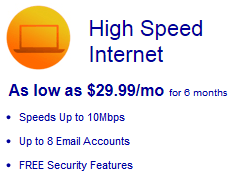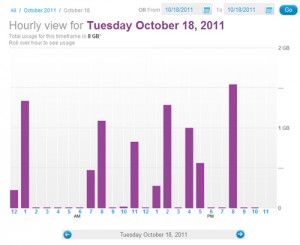 Last fall, our regular reader Scott wrote us about recent rate increases Bright House Networks imposed on broadband-only customers: $50/month for Internet access. He learned from Stop the Cap! that a virtually identical, but lesser-known provider was ready and willing to provide six months of essentially equivalent Internet service for $20 less a month.
Last fall, our regular reader Scott wrote us about recent rate increases Bright House Networks imposed on broadband-only customers: $50/month for Internet access. He learned from Stop the Cap! that a virtually identical, but lesser-known provider was ready and willing to provide six months of essentially equivalent Internet service for $20 less a month.
If your new customer promotion with Bright House or Time Warner Cable has ended, Earthlink can deliver essentially equivalent cable Internet service for $29.99 a month for six months. You do not receive the Powerboost temporary speed jump or a Road Runner/Bright House e-mail account, but you do save $120 over the promotional period.
Scott’s six month promotion with Earthlink was almost up, so he started calling Bright House looking for a returning customer promotion from them, and ran into a brick wall.
“Corporate wouldn’t budge,” Scott shares. “Two people kept giving me the run-around and excuses.”
“I was able to make the switch back to Bright House from Earthlink to keep my $30 a month promotional price for a second consecutive six month period,” Scott explains. “[But] I had to call an authorized [reseller] to give me the price as a ‘new customer.'”
But it wasn’t easy. Involving third party resellers can become complicated because those independent businesses rely on commissions earned when new customers sign up. An existing cable customer bouncing between providers may not be eligible for a commission, and can stall the switching process.
Scott spent an hour on the phone with Bright House getting them to apply the promotion to his account.
In general, Time Warner Cable customers have been able to bounce between new customer promotions from Earthlink and the cable company and back again without too much trouble. Time Warner’s own promotion offers $29.99 a month Internet for a year, which is actually better than Earthlink’s six month deal. Do a Google search for “Bright House promotions” and you will find third-party resellers all pitching six months of Bright House broadband service for $29.99 a month.
We recommend calling providers directly to establish service where possible, and if they refuse, you can always threaten to walk. Providers become a little more willing to deal if you’re prepared to pull the plug.


 Subscribe
Subscribe








